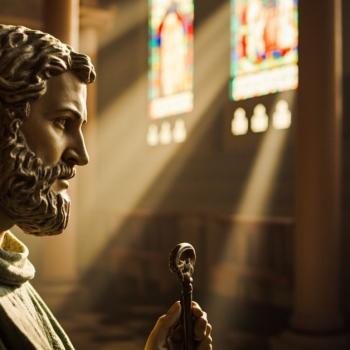
Paul tells us our relationship and experience of God will change in the eschaton. He does this by comparing and contrasting how our eschatological experience will be in relation to how we can experience God now, which is as through a “mirror dimly”: “For now we see in a mirror dimly, but then face to face. Now I know in part; then I shall understand fully, even as I have been fully understood” (1 Cor. 13:12 RSV). We must read Paul as if he were suggesting that in the eschaton we will comprehend God; rather, he says that we will have a direct, undim, that is, unhindered engagement with God. We will realize our full potential. We will see and experience God to our best ability, without any defects, such as sin, getting in the way of our apprehension. Yet, just as we experience or see God as if dimly through a mirror now, it can be said we will still see God as if through a mirror; we will not comprehend God or the divine nature as it is in itself for that will continue to be impossible. But instead of as seeing the mirror in a barely lit context, the mirror will be completely illuminated, and instead of being tarnished or imperfect, the mirror will be perfected, making its reflection will be as perfect as possible.
In the eschaton we will be united with God in the light of God’s grace, and all things will shine and reveal God to us. Indeed, through God’s grace, all things will be objectively perfected, so that everything will also reflect God in and through themselves. They will each present to us a kind of mirror reflecting, each of them reflecting the glory of God in their own unique way. That, of course, will include ourselves, especially in our spiritual nature, and so in and through our minds. This means that not only will we be able to discern God through others outside of ourselves, we will come to know God within, within our mind our intellect, as our mind will reflect the light of God. Indeed, in will shine so bright within us, it will also affect our physical form, which will also shine, as it were, with the light of God (a truth which is implied by the use of halos in iconography). We will be transformed by the light of God’s grace and become, as it were, light ourselves, though of course, we will be reflected lights in relation to the uncreated, unbounded light of divinity.
Thus, in the eschaton, we will discern transcendent greatness of God, and but we will also realize the immanence of God in and through all things. The light of God transcends us even as it is revealed in and through us. We will participate in and with it, and in that participation, find ourselves becoming transformed so that we can be one with it. But because it is something we participate it, that means, though we are united with it, it will still be something which transcends us. This will help us better realize the truth about our relationship with God:
The immensity of the divine majesty is such that we ought to understand that he is within all things but not enclosed in them, and that he is outside all things but not shut out; and therefore he is inside all things in order to contain them, and exterior so that he might envelop all things in a noncircumscribed way in the immensity of his magnitude. Therefore by the fact that he is exterior, he is shown to be the Creator; by the fact that he is interior, he is proved to govern all things. And lest those things that are created might be without God, God is within all things; and lest they be outside God, God is exterior, so that he encloses all things.[1]
We will truly experience God in God’s immanence, and through that experience and apprehension, we will properly know, from experience and not just theory, the reality of God’s transcendence. We will not ignore it. We will not forget it. It will always be apparent to us, indeed, the more we apprehend God, the more we become aware it. For the more we apprehend the light of God within, the more we will become aware of the transcendent, incomprehensible glory of God, so that the more we experience the glory of God, the more we will know that God is greater than what we ever can say or apprehend. What we apprehend, what we experience, is truly God. For what we experience and come to know is God in relation to the way God acts towards us, and God’s simplicity means God’s essence is not other than God’s activity, even if the activity can be and is logically divided up by us. This is what the beatific vision entails. All the darkness, all the tarnish, all the imperfections which get in the way of apprehending and seeing the light, in all the ways the light can and does shine, will be overcome, allowing us to come to know God in a variety of ways.
The more we embrace what is truly good, the more that good will help us, purifying our perception of God. The more, then, we participate in some form of the good, the more we can experience, even now in anticipation of the eschaton, the eschatological glory which is promised to us. We have the mirror which reflects God within us, even is all other creatures reflect God in their own ways. Thus, as St. Maximos the Confessor tell us, those mirrors will reflect the good the more such good is embraced:
The mirror, so to speak in terms of a definition, is a state of consciousness possessing the total form of all the good things that have been wrought in practice, and it is through this form that a man with a pure mind is able to see God. Or it is the habit of a stable mind committed to ascetic practice, encompassing all the virtues uniformly combined together like a single divine face. [2]
This means, as has been said, as all things can and do reflect the light of God in accordance to the good within them. Some will reflect the light greater than others, even as some mirrors are bigger, with better reflective surfaces than others. This is what allows us to differentiate the various secondary lights, even when they reflect the same light. As their potentials differ, so what they can and do reflect will differ, though all of them will reflect the same light of God. Those who reflect the light of glory greater than others will be able to share their light to others, providing others revelations about God which they have yet to experience or apprehend within themselves, and in this way, those who reveal more about God can be said to be “closer” to God than others. This is what (Pseudo)-Dionysius understood in relation to hierarchy. It was all about the way revelation can be and is shared, with those “closer” to God bringing more, greater, less diminished forms of revelation to those “further” from God, with the hope, not to reify the way things are, but to have those “further” from God brought closer in so that they can eventually share the same glory as those who are already “closer” to God. Al-Ghazālī explained the hierarchy in this fashion:
If the heavenly lights from which the earthly lights become kindled have a hierarchy such that one light kindles another, then the light nearest to the First Source is more worthy of the name “light” because it is highest in level. The way to perceive a similitude of this hierarchy in the visible world is to suppose that moonlight enters through a window of a house, falls upon a mirror attached to a wall, is reflected from the mirror to an opposite wall, and turns from that wall to the earth so as to illuminate it. You know that the light on the earth comes from that on the wall, the light on the wall from that on the mirror, the light on the mirror from that in the moon, and the light in the moon from the light in the sun, since light shines from the sun onto the moon.[3]
As another way to remind us that must take such a hierarchy as a relative, constructed, truth and not as an absolute truth with a structure that will not change, we must remember that God is immanent in creation so that all things can be said to be as close to God as with each other. Until we are pure, and our mirror is perfected, without any tarnish, we can say that those with a more “perfected” mirror are “closer” to God than those which are more tarnished. The point of the hierarchy is to have us open to those who reflect God more but also to encourage us to become like those who do so. To confuse the hierarchical structure as a way to suggest institutional structures will be absolutized in the eschaton is to undermine the work of God in creation. But, on the other hand, to deny the relative value of such a hierarchy, and how an institution can imperfectly represent and symbolize it, also undermines the value of God’s light in creation, and the way God can and does find many ways to share divine glory through creation, including the relative structures found within it. Nonetheless, when talking eschatologically, it is important to realize that the relative nature of the hierarchy will be shown for what it is. Everywhere, because God is within all things, is said to be the center, and so in and through all things, the light of God will shine, each in their own way, each with their own glory:
Again observe in this transparent circle of your mind, as in a mirror, and by observing reach, everywhere in the world and everywhere outside the world, the spherical intellect and the intelligible sphere, whose centre is everywhere, since it penetrates right through the universe, but whose circumference is nowhere since it extends boundlessly beyond the universe. Look! See the divine form, the fount of all forms, the one form and the form of all forms. See that form presenting itself everywhere to all minds, especially those that are pure like mirrors! Mark how the God of gods pulsates with light. Beside Him, there is no true god. He abounds the eternal goodness of the good, completely free from evil. Here shines the immeasurable light of lights. Sun to all minds. [4]
We should seek a way to engage God. We must embrace the good. We must polish the mirror within, cleansing it from every stain or tarnish or imperfection. The more we do so, the more we will experience the immanent eschaton, realizing of course, what we experience now is only in anticipation of what we will experience in eternity.
[1] St. Isidore of Seville, Sententiae. Trans. Thomas L. Knoebel (New York: Newman Press, 2018),38.
[2] St. Maximos the Confessor, On Difficulties in Sacred Scripture: The Responses to Thalassios. Trans. Fr. Maximos Constas (Washington, DC: CUA Press, 2018), 255 [Question 46]
[3] Al-Ghazālī, The Niche of Lights. Trans. David Buchman (Provo, UT: Brigham Young University Press, 1998), 13-14.
[4] Marsilio Ficino, The Letters of Marsilio Ficino. Volume 5 (Liber VI). trans. by members of the Language Department of the School of Economic Science, London (London: Shepheard-Walwyn, 1994), 25 [Letter 13: To Cardinal Giovanni].
Stay in touch! Like A Little Bit of Nothing on Facebook.
If you liked what you read, please consider sharing it with your friends and family!
N.B.: While I read comments to moderate them, I rarely respond to them. If I don’t respond to your comment directly, don’t assume I am unthankful for it. I appreciate it. But I want readers to feel free to ask questions, and hopefully, dialogue with each other. I have shared what I wanted to say, though some responses will get a brief reply by me, or, if I find it interesting and something I can engage fully, as the foundation for another post. I have had many posts inspired or improved upon thanks to my readers.
















